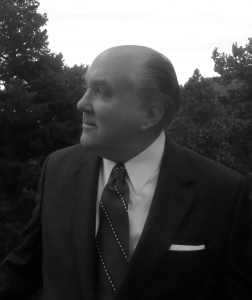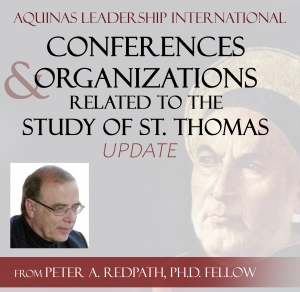“It is necessary to call into council the views of our predecessors, in order that
we may profit by whatever is sound in their thought and avoid their errors.”—Aristotle, de Anima, Bk. 1, ch. 2, 403b20-23

Pat Carmack
At the Adler-Aquinas Institute (“AAI”), we heartily agree with Aristotle’s assessment of the importance of consulting the views and opinions of the great thinkers of the past—those whose wisdom and insights, or influence, have withstood the tests of time. The motto of the AAI, “Understanding St. Thomas through the Great Books,” is largely based on that insight. We are indebted to Dr. Mortimer J. Adler for collecting and organizing a great deal of that wisdom into different, easily accessible sets of books, especially the Great Books of the Western World. That impressive, 60-volume collection verifies Aristotle’s observation, noted in his Metaphysics, “The investigation of the truth is in one way hard, in another easy. An indication of this is found in the fact that no one is able to attain the truth adequately, while, on the other hand, we do not collectively fail, but everyone says something true about the nature of things, and while individually we contribute little or nothing to the truth, by the union of all a considerable amount is amassed” (Aristotle, Metaphysics, Bk. 2, ch. 1, 993b1-3). For many years Dr. Adler was the standard bearer of Thomism in America. In the words of AAI Fellow Dr. Curtis L. Hancock, “Dr. Adler was a distinctly American Thomist.” To honor Dr. Adler for the many things he did during his lifetime to promote Thomistic thinking and for helping our Fellows launch various educational initiatives (such as the Great Books Academy and the Angelicum Academy), we have gratefully named this Institute in his honor together with the Angelic Doctor, St. Thomas Aquinas.
We believe we are on solid ground when we associate Dr. Adler with Aquinas. To quote Adler:
“To say, as I have said, that I have not learned a single fundamental truth from the writing of modern philosophers is not to say that I have learned nothing at all from them. With the exceptions of Hegel and other post-Kantian German philosophers, I have read their works with both pleasure and profit. The pleasure has come from the perception of errors the serious consequences of which tend to reinforce my hold on the truths I have learned from Aristotle and Aquinas. The profit has come from the perceptions of new but genuine problems, not pseudo-problems, perplexities, and puzzlements invented by therapeutic positivism and by linguistic or analytical philosophy in our own century. In every case the correction of an error or the repair of a deficiency in the philosophy of Aristotle and Aquinas rests on the underlying and controlling principles of Aristotelian and Thomistic thought. In fact, the discovery of such errors or deficiencies almost always springs from close attention and leads to a deeper understanding of those principles” (Mortimer J. Adler, A Second Look in the Rearview Mirror (New York: Macmillan Publishing Company, 1992, pp. 241–242).
And:
“With one or two exceptions, all the fundamental philosophical truths that I have learned in more than fifty years, to which I am now firmly committed, I have learned from Aristotle, from Aquinas as a student of Aristotle, and from Jacques Maritain as a student of them both. I have searched my mind thoroughly and I cannot find in it a single truth that I have learned from works in modern philosophy written since the beginning of the 17th century. If anyone is outraged by this judgment about almost four hundred years of philosophical thought, let him recover from it by considering the comparable judgment that almost all modern and contemporary philosophers have made about the two thousand years of philosophical thought that preceded the 17thcentury. (Mortimer J. Adler, “The Bodyguards of Truth,” Proceedings of the American Catholic Philosophical Association, 1976, p. 125).
Why a New Institute? The English rendering of the Greek word “philo-sophia,” translated literally, is “love of wisdom.” As Adler noted, unhappily little love of wisdom exists today in “philosophy” as taught in our universities and colleges, whether they are dominated by the linquistic and analytical “philosophy” that is regnant at Oxford and Cambridge, or by the positivism, existentialism, phenomenology, structuralism, and some older versions of semiotics that are current on the continent of Europe. Anyone familiar with the state of most philosophy departments in America would add: and in America.
In respect to theology a similar situation prevails, including on Catholic campuses, where the very errors in understanding St. Thomas Aquinas, which, more than anyone else, Etienne Gilson identified and warned us about, are almost universally part of the way Thomism is taught. This refers, especially, to “’manual” (or “textbook,” Cartesian) Thomism, which tends to be taught as a mere series of propositions in a closed system of thought or logic, instead of as the act of a habit of soul. If philosophy, and especially theology, is chiefly reduced to a body of knowledge so taught, then two things inevitably result: 1.) Studying philosophy and theology becomes tedious, boring, a mere exercise in rote memorization and shallow debate. (This is precisely what happened to scholasticism when it suffered the same reductionist fate centuries ago and began to be taught and perceived as a “dry and dusty, passé” species of nominalism. 2.) Once the limited teachings of such a Thomism falsely-so-called are memorized and supposedly “fully understood” (as evinced by an “A” or passing grade), this procedure often leads to intellectual pride, and tends to produce students who mistakenly confound wisdom with being disputatious.
Whether as part of metaphysics or revelation concerning supernatural truths, philosophy and theology start in wonder, with the ineffable, mystery. “Mystery” does not mean something about which we can never know anything. It means something about which we can always learn more and yet never fully exhaust our understanding. Mystery so understood is precisely what keeps alive in philosophers (as the term was understood by the best of the ancient Greeks) the sense of wonder (and, hence, humility). This quality in Socrates continues to make him such an attractive figure over two millennia after his death.

Peter Redpath
As Adler noted, “There are very few self-evident, necessary truths, which are undeniable because it is impossible to think the opposite. These are the only philosophical truths that are in the realm of certitude—beyond the shadow of a doubt. All the rest are in the realm of doubt—either beyond a reasonable doubt or probable by a preponderance of the evidence. None of these probable truths are incorrigible. Their probability is forever subject to change as new evidence or rational arguments correct earlier judgments about their degree of probability.” (Mortimer J. Adler, A Second Look in the Rearview Mirror (New York: Macmillan Publishing Company, 1992, p. 244).
In theology the situation is similar: very few revealed truths exist that are not also knowable by unaided natural reason; relatively few certain theological conclusions based on those revealed truths exist that the faithful are similarly bound to accept and believe. Regarding all the rest, as St. Augustine noted, provided they do not contradict the foregoing, room exists for fruitful discussion and inquiry. Otherwise, theology, too, becomes sterile, merely an exercise in memorization, not a continual opening to, and deeper penetration of, the ineffable and mysterious being of God and his works.
A sound philosophical metaphysics (rooted in the self-evident truths, principles, initially rooted in sense wonder about the being of sensible things and faculties and habits of the intellectual soul) and a sound theology (rooted in revelation and the Magisterium consistently interpreting that revelation and the necessary conclusions therefrom) avoid the reductionism of “philosophy” and “theology” falsely-so-called and the resulting intellectual pretentiousness, tendentiousness, sterility, and foolishness that they tend to produce. Such sound modes of inquiry illuminate mysteries about reality, especially about the “highest things,” encourage collective wonder and social cohesion, and foster a deeper penetration of wisdom. In so doing, as Aristotle tells us, while “individually we contribute little or nothing to the truth, by the union of all a considerable amount is amassed” (Aristotle, Metaphysics, Bk. 2, ch. 1, 993b1-3).
– AAI Fellows Peter A. Redpath, Ph.D. and Patrick S.J. Carmack, J.D.
